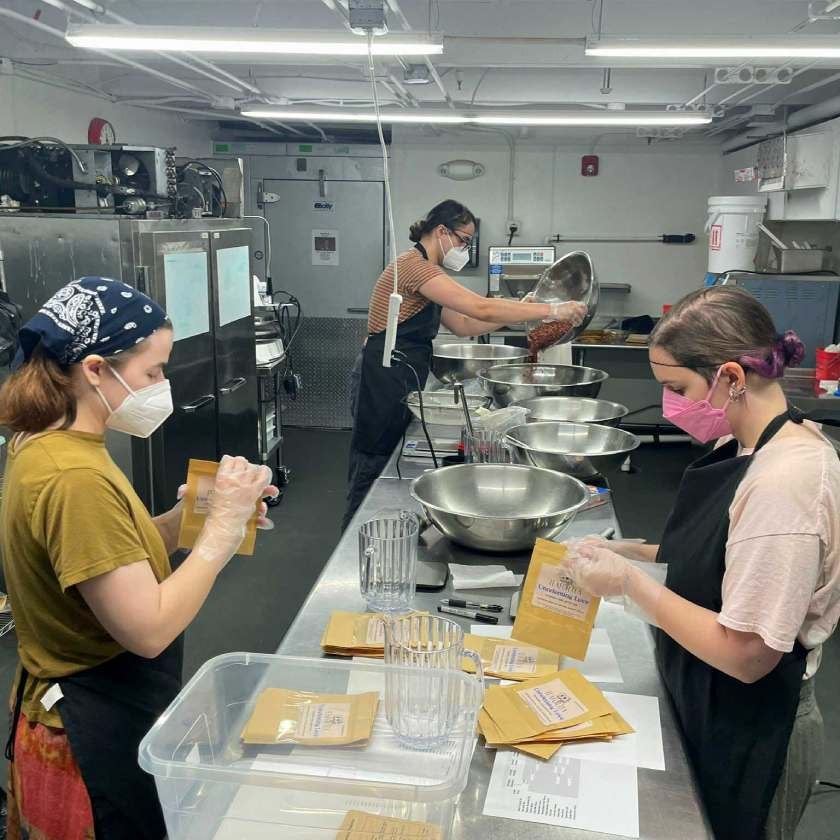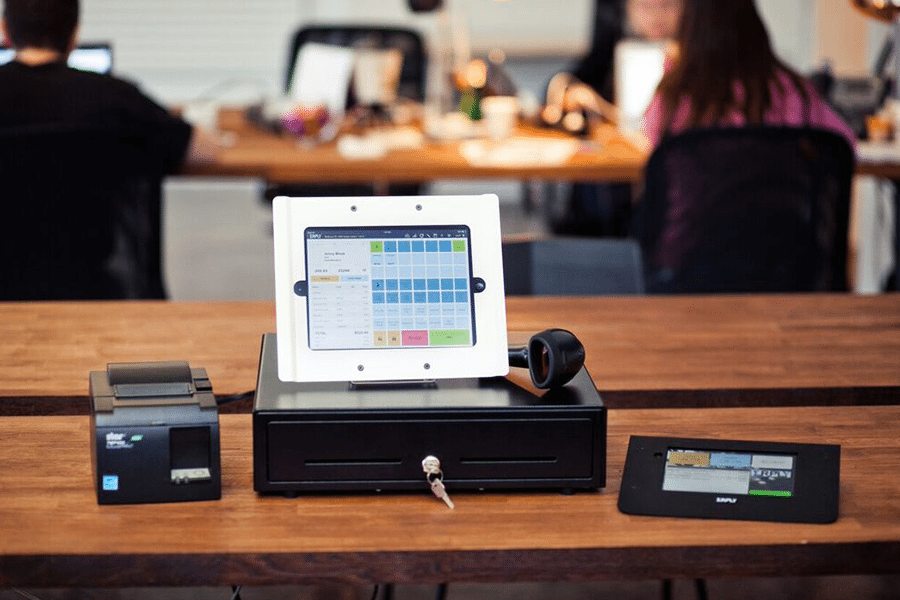A commissary kitchen is a commercial kitchen used for prep, food storage, or off-site food production for various food businesses. These kitchens are useful for prepping or preparing large amounts of food in a space focused solely on food production. Commissaries are ideal for businesses that serve food offsite, like food trucks and caterers. Without the cost or overhead of managing a dining room, these kitchens become the foundation for many different food business types.
Key Takeaways:
- Commissary kitchens are food production facilities that are certified for legal and compliant food processing and food sales.
- Commissary kitchens often cost less than a full restaurant kitchen.
- Many commissary kitchens offer key support for business development, which can help new businesses in growing their sales.
How a Commissary Kitchen Works
A commissary kitchen is a professional kitchen space equipped with professional cooking equipment and licensed by the local health department. A commissary kitchen may be rented or owned by a food business.
A commissary kitchen can be a dedicated space for one business (like a large catering business or food truck fleet). Most commissaries are shared commercial kitchen spaces where multiple food businesses work side-by-side. Many urban areas offer commissary kitchens, in which different sections of the space are rented to different operators. These food businesses could be caterers, food truck operators, ghost kitchens, or packaged goods manufacturers.
Commissary Kitchen Types
There are a few different types of commissary kitchen. There is no single “best” option for a commissary kitchen; what is best for your business depends on your specific needs and food production requirements. Factors such as space, cost, and equipment specifications will all factor into the type of commissary kitchen you end up using.
Some common commissary kitchen types are:
- Private kitchen: A private kitchen is a commissary kitchen solely used by your business. This kitchen is either a rented or owned space meant for producing your products only. It is maintained to your standards, has equipment to your specifications, and is only meant for your business. This is a common setup for a large catering business or a food truck fleet.
- Shared commissary: A shared commissary kitchen is a space that has multiple food businesses out of it. A shared commissary kitchen meets health department requirements, has ample equipment for all businesses, and has dedicated food production and storage locations for each business renting space. It is common for independent food trucks, caterers, and small food producers to rent from a shared commissary.
- Restaurant kitchen: Some restaurants rent out their kitchen space to other food businesses on off-days or off-hours. This can offer an additional revenue stream for the restaurant. Using an off-hours restaurant kitchen is popular with pop-up restaurants, food truck operators, and caterers.
- Food incubators: A food incubator is a shared commissary kitchen that has additional resources to help grow your business. This can include legal advice, marketing, and community awareness support, and operational oversight support. I have worked in a food incubator commissary kitchen, and I find them invaluable for new food businesses looking to establish and grow their brand. Food incubators commonly require an application from aspiring incubator members, in addition to the typical rental agreement.
- Community kitchen: Community kitchens are licensed kitchens found in community spaces like churches, community centers, and other nonprofit businesses. These community kitchens tend to be lower cost than a typical commercial kitchen, though their equipment and storage facilities may be limited. Community kitchens are excellent for small caterers, food trucks, or food businesses that have irregular or seasonal food production schedules.
Commissary Kitchen Costs
There are a variety of costs one can expect when it comes to renting out or using a commissary kitchen. Costs include rent, equipment, storage fees, and cleaning/maintenance fees. Below are the common costs for commissary kitchens:
- Hourly rates: Some kitchens charge users anywhere from $20 to $60 an hour for using a commissary kitchen space. The hourly rate is often for commissary kitchens where businesses use the space for irregular hours throughout the week or month. Hourly rate agreements are best for very small food businesses that cannot commit to a full monthly rental agreement with a large commercial kitchen.
- Monthly membership: Food incubators and some commissary kitchens opt to work off of a monthly membership rate. Monthly fees range from $250 to $1,500 a month, depending on the equipment offered and the size of the space. This rate type is ideal for heavy-use commissary kitchen businesses.
- Storage: Some facilities offer dry, cold, and freezer storage for additional fees anywhere from $25 to $200 per month. Storage fees are often reasonable and not a high cost.
- Maintenance/Cleaning fees: Some kitchens build in regular cleaning and maintenance fees quarterly or bi-annually. These can be anywhere from $100 to $400.
- Equipment fees: Certain equipment, such as deli slicers, blast chillers, or industrial kettles, require a fee to be used regularly. Fees for this equipment can vary.
- Other fees: Marketing, business support, and supplies fees may be included for commissary kitchen costs and will vary widely by location. I’ve seen anywhere from a couple hundred dollars to nearly $1000. These fees are always optional, and may be a one-time fee or an ongoing fee, depending on the agreement.
When to Use a Commissary Kitchen
There are a couple of key reasons a food business would consider using a commissary kitchen. The biggest reason is the requirement to meet health department regulations. Nearly every food business must produce their food in a licensed and regularly inspected site. A commissary kitchen has its licenses, so it is a great option for new food businesses. Renting commissary kitchen space is less expensive than building, equipping, and licensing a new commercial kitchen for your business.
A commissary kitchen can also be used to scale a business, offering extra space to make key products that you are selling more of. For example, say you want to expand your restaurant into catering, but you lack the prep space in your own kitchen. A commissary kitchen would be the perfect fit. Finally, some restaurants simply need more kitchen space, and commissary kitchens can fit this need when operators need a dedicated site for takeout or for making shelf-stable, in-house products such as fresh pasta, bread, jams, or jarred sauces.
These are some of the use-case scenarios for commissary kitchens you will most commonly see:
- Food trucks: Food trucks serve food out of a mobile kitchen, often parking and selling in busy areas. The problem with food trucks is that none of the truck’s cooking or refrigeration equipment works unless the truck is running or hooked up to a generator. So food trucks need powered kitchen space to properly prep and store their food at safe temperatures. Most county health departments require food trucks to show proof of a relationship with a commissary kitchen when applying for their food safety licenses.
- Caterers: Commissary kitchens are great for caterers, as catering operations often happen off-site in customer-designated areas. If you have ever catered at a school or client’s house, you will know that most of the prep will have to be done before you arrive. Residential and offsite kitchens simply do not have the counter space or equipment you need to prepare large amounts of food. A commissary kitchen has large prep counters, cooking equipment, and plenty of cold storage space.
- Packaged foods businesses: Commissary kitchens will often have some access to industrial cooking equipment, such as steam-jacketed kettles and blast chillers, making them the perfect location for smaller packaged food businesses. I have personally worked in a commissary kitchen for a packaged food business, and it was incredibly helpful to have a clean space equipped with the proper tools. This environment allowed us to produce, package, and sell products safely and at scale.
- Bakers: Bakeries or baked goods-focused businesses thrive in commissary kitchens. Wholesale business is huge for bakeries, and having a commissary kitchen is great for fulfilling these orders. Additionally, restaurants that need extra room to expand their in-house baked goods offerings can use a commissary kitchen to scale their operation efficiently.
- Cottage food businesses: Cottage food businesses sell shelf-stable foods that can be safely stored at room temperature, like bread and preserves. In some locations, health departments require cottage food businesses to prepare their products in a licensed kitchen. Even in locations where the health department will certify home kitchens for cottage foods businesses, a commissary can be useful; having a dedicated kitchen space with long countertops and professional-grade equipment can help a cottage food business grow at a much faster pace.
- Ghost kitchens: Ghost kitchen concepts, or virtual restaurants, can benefit from commissary kitchens. Many commissary kitchens are optimized for delivery/takeout-focused businesses. Due to a virtual restaurant only needing a space to prepare food, the commissary kitchen is one of the best options for virtual restaurants to operate from.
- Meal prep businesses: Meal prep businesses are similar to caterers and virtual restaurants, only needing a space for preparing and packaging food. The food-safe environment and ability to make larger portions of products make the commissary kitchen a great tool for growing meal prep companies.
Commissary Kitchen Benefits & Drawbacks
Using commissary kitchens has its advantages and disadvantages, and it’s important to be aware of both. The benefits of a commissary kitchen often include lower operating costs and larger food production spaces. These kitchens comply with local health regulations and are equipped with essential tools and storage facilities needed to run your business effectively.
Some additional pros of using a commissary kitchen include:
- Cost-saving: Renting out a space to produce food products is cheaper than building your own.
- Compliant kitchen: Commissary kitchens have all relevant licenses and meet health department regulations for food processing.
- Quicker starting point: A commissary kitchen gives operators the base function to produce their product, helping them get to market quickly.
- Networking: Commissary kitchens, especially food incubators, have great networking opportunities that help you connect with other food businesses in your area.
- Scalability: You can always increase production capacity by renting more space as your business grows.
- Storage options: Commissary kitchens have storage for all types of food and are ideal for businesses that have little storage elsewhere, like a food truck.
- Commercial equipment: Commercial equipment is expensive, and having maintained equipment to use whenever you need it is a major win.
There are also some cons to using a commissary kitchen. The biggest complaint I hear from producers comes from the stresses of using shared space; you need to trust and rely on the other food businesses to use the space respectfully and clean up after themselves. Some costs, limited access, and restrictions imposed by a commissary kitchen can also be drawbacks. Below are some cons of using commissary kitchens:
- Shared space: You may need to coordinate with other producers on when you can use key equipment or actual space within a shared kitchen.
- Limited access: Some kitchens are not open 24/7 and may not be open during key hours that your business requires.
- Restrictions: Some commissary kitchens will restrict outside equipment, leading you not to be able to use items you want in order to expand your product offering.
- Hourly costs: Hourly rental agreements can get pricey if your business needs a lot of hours to prepare your food, making it a poor pricing model for your business.
- Extra fees: Some kitchens can be fee-heavy, charging you extra for fridge space or storage shelving.
How to Rent a Commissary Kitchen
Renting a commissary kitchen is relatively easy, but it requires due diligence. Understanding the needs of your business and thoroughly researching your chosen kitchen space is key to finding the best shared kitchen for you. Below are the basic steps you will take in order to find the best commissary kitchen to rent for your food business.
- Know your needs: What kind of food business do you have, and your storage/equipment requirements are all factors in determining the best commissary kitchen for you. Additionally, where the kitchen is located, especially for takeout or delivery-focused businesses, is super important. Also, consider how often you will use the space; do they currently have the hours you need available?
- Search for kitchens in your area: Use Google, local contacts, small business centers, and social media to find local kitchens in your area. Online directories like Yelp or platforms like LinkedIn are other great resources for finding local kitchens you can use.
- Visit kitchens: Do not settle on the first kitchen you see. If you can, visit multiple options in your area and ask to tour the facility. Look for cleanliness, equipment condition, storage capabilities, and accessibility for delivery drivers delivering supplies.
- Review and negotiate costs: Next up is reviewing costs. This includes hourly or monthly fees plus additional fees you may need to pay for equipment or storage. Knowing your total fee structure is important for understanding if the kitchen is the right fit for you.
- Ensure proper licensing and insurance are provided: Checking that prospective commissary kitchens have the correct licensing or insurance is essential when deciding on whether or not to use the space. This includes health permits, a proper cleaning schedule, and correct insurance options.
- Follow up on success stories: Ask for examples of the types of businesses using the space and the success past and current businesses have had. If a commissary kitchen has proven to help businesses like yours succeed, it is likely a good fit.
- Sign the agreement and use the space: Once you have found a kitchen that fits your budget, meets your equipment, location, and storage requirements, meets health and local law requirements, and is ideal for your business, you can sign an agreement and begin using the space.
Commissary Kitchen Case Studies
Often, food business operators do not see the benefits of a commissary kitchen space until they use one. Below are two examples of two food businesses that currently use a shared or commissary kitchen to expand their business potential. Note how these spaces both improved growth, and shaped the core product offering for each business.
Tea for Tea
Tea for Tea is a Nashville-based tea company founded by Ella Vinogradova. The company sells packaged tea, focusing its production out of a commissary kitchen. Vinogradova used the commissary kitchen she operates out of as a resource to manage regulatory hurdles, get fully licensed, and sell her product in line with local food law. On top of that, she uses the kitchen space to expand her business and grow at a fast rate. Below is her take on why the commissary kitchen has been so integral to her business:
“Using a commissary kitchen saved me more than 90% of the hassle and expense of the regulatory process. With the help of the kitchen staff, I was fully licensed and approved for nationwide sales in just a couple of weeks. On top of that, it has been the best place to network and meet other local food entrepreneurs I’ve found. I’ve made so many amazing connections and have been invited to so many amazing events. Since joining the kitchen, my business has grown faster than ever before.”
As you can see, the use of this kitchen was a tool not only in expanding production capacity, but also in getting the businesses legally compliant to sell products. The kitchen space’s time-savings allowed Vinogradova to get her product to market quickly. The support structure of a commissary kitchen and the professional food setting helped Tea for Tea grow and be successful.

Berg Bites
Berg Bites is a gluten-free, clean energy snack company that focuses on energy bars, bites, and other products. Starting as a concept out of a dorm room, the founder, Daniel Berg, created a consumer packaged goods (CPG) company that would deliver nutritious and delicious bites for snacking and energy purposes. To get his company going, Berg partnered with Union Kitchen out of Washington, D.C. Since then, the brand has taken off, being sold out of Sprouts Farmers Markets, national distributor KeHE, and direct-to-consumer online. Berg has even sold Berg Bites products to the New Orleans Pelicans. On their blog, Union Kitchen shared how Daniel utilized their facility:
“Following graduation, Daniel faced the typical hurdles that many food entrepreneurs encounter: finding sufficient kitchen space and the right equipment to bring his dream to fruition. Crafting quality snacks requires the right tools and environment, which can be challenging for startups with limited resources. Daniel worked with the Union Kitchen team to develop a mission and strategy for his brand and launched a market-ready product. He then became a manufacturing expert in our shared kitchen and continues to own his production and take a phased approach to growth!”
By utilizing the space, Daniel was able to turn a small cottage food business into a fully-scaled CPG goods business being distributed in top stores and food business channels nationally. The potential commissary kitchens have to grow a product and brand is massive.

What Is a Commissary Kitchen Frequently Asked Questions (FAQs)
Commissary kitchens are popular and utilized by a variety of food businesses. There are still some common questions many have regarding these spaces. Below are the most frequently asked questions regarding commissary kitchens.
Last Bite
A commissary kitchen is a valuable tool for many food operators. Do your due diligence in finding the best-fitting commissary kitchen for your business; tour locations and ensure the kitchen has the necessary equipment. Finding a dedicated, certified, professional food production space can be your business’s key to increasing sales and growing your customer base. Using a commissary kitchen can reduce costs, maximize production, and grow your business faster than you could alone.
ALSO READ



